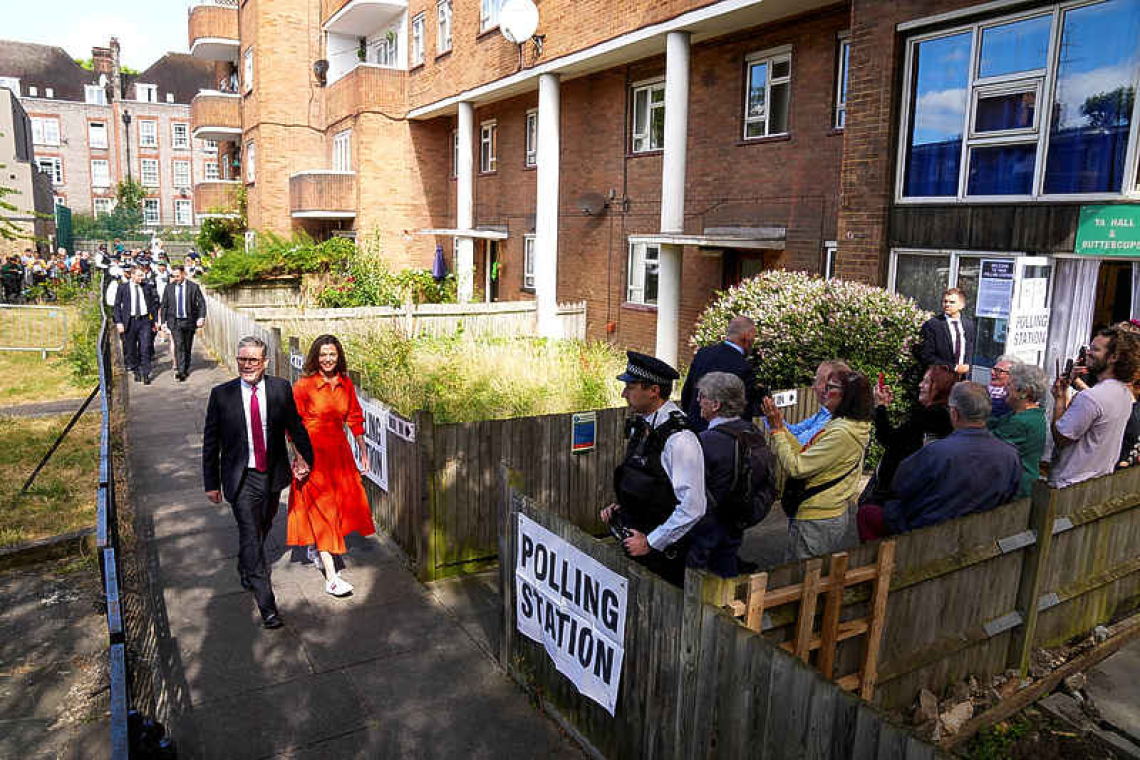Britain's opposition Labour Party leader Keir Starmer and his wife Victoria Starmer walk outside a polling station during the general election in London, Britain, on Thursday.
LONDON--Keir Starmer will become Britain's next prime minister on Friday with his Labour Party set to win a massive majority in a parliamentary election, an exit poll indicated, forecasting Rishi Sunak's Conservatives would suffer historic losses.
Centre-left Labour was on course to capture 410 of the 650 seats in parliament, an astonishing reversal of fortunes from five years ago when it suffered its worst performance since 1935. The result would give Labour a majority of 170 and would bring the curtain down on 14 years of increasingly tumultuous Conservative-led government.
"If what we have seen so far holds out, then it is clear that the British people have voted for change," said Labour's Rachel Reeves, who is set to become Britain's first female finance minister.
"In the coming hours, after 14 years, people will wake up to the prospect of a new government: the first Labour victory in nearly two decades, a page turned, a new chapter started, a chance to look ahead to a brighter future that seemed so remote for so long," Reeves said after she won her seat.
Sunak's party were forecast to only win 131 seats, the worst electoral performance in its history, as voters punished them for a cost-of-living crisis, and years of instability and in-fighting which has seen five different prime ministers since the Brexit vote of 2016. The centrist Liberal Democrats were predicted to capture 61 seats while the right-wing populist Reform UK party, headed by Brexit campaigner Nigel Farage was forecast to win 13, far more than expected.
Early results confirmed Labour and the Lib Dems were taking seats from the Conservatives, while Reform also claimed its first victory, and pushed the Conservatives into third place in many areas.
"Reform has clearly done well tonight and I know the reaction of some of my colleagues will be that we should lurch to the right," one Conservative lawmaker, who declined to be named, told Reuters. "But Labour have won this election in the centre and we need to remember that lesson."
Overall, the exit poll did suggest British voters had shifted support to an internationalist centre-left party, unlike in France where Marine Le Pen's far-right National Rally party made historic gains in an election last Sunday. It was not just the Conservatives whose vote was predicted to have collapsed. The pro-independence Scottish National Party was forecast to win only 10 seats, its worst showing since 2010, after a period of turmoil which has seen two leaders quit in little over a year.
"If this exit poll is correct, then this is a historic defeat for the Conservative Party," Keiran Pedley, research director at Ipsos, which carried out the exit poll, told Reuters. "It looked like the Conservatives were going to be in power for 10 years and it has all fallen apart."
Sunak stunned Westminster and many in his own party by calling the election earlier than he needed to in May with the Conservatives trailing Labour by some 20 points in opinion polls. He had hoped that the gap would narrow as had traditionally been the case in British elections, but instead had a fairly disastrous campaign.
It started badly with him getting drenched by rain outside Downing Street as he announced the vote, before aides and Conservative candidates became caught up in a gambling scandal, and Sunak's early departure from D-Day commemorative events in France further fuelled criticism.







